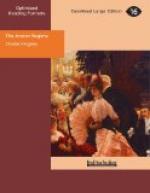All I dare say is, that Freemasonry emerges in its present form into history and fact, seemingly about the beginning of George I.’s reign, among Englishmen and noblemen, notably in four lodges in the city of London: (1) at The Goose and Gridiron alehouse in St. Paul’s Churchyard; (2) at The Crown alehouse near Drury Lane; (3) at The Apple Tree tavern near Covent Garden; (4) at The Rummer and Grapes tavern, in Charnel Row, Westminster. That its principles were brotherly love and good fellowship, which included in those days port, sherry, claret, and punch; that it was founded on the ground of mere humanity, in every sense of the word; being (as was to be expected from the temper of the times) both aristocratic and liberal, admitting to its ranks virtuous gentlemen “obliged,” says an old charge, “only to that religion wherein all men agree, leaving their particular opinions to themselves: that is, to be good men and true, or men of honour and honesty, by whatever denominations or persuasions they may be distinguished; whereby Masonry becomes the centre of union and means of conciliating true friendship among persons that otherwise must have remained at a distance.”
Little did the honest gentlemen who established or re-established their society on these grounds, and fenced it with quaint ceremonies, old or new, conceive the importance of their own act; we, looking at it from a distance, may see all that such a society involved, which was quite new to the world just then; and see, that it was the very child of the Ancien Regime—of a time when men were growing weary of the violent factions, political and spiritual, which had torn Europe in pieces for more than a century, and longed to say: “After all, we are all alike in one thing—for we are at least men.”
Its spread through England and Scotland, and the seceding bodies which arose from it, as well as the supposed Jacobite tendency of certain Scotch lodges, do not concern us here. The point interesting to us just now is, that Freemasonry was imported to the Continent exclusively by English and Scotch gentlemen and noblemen. Lord Derwentwater is said by some to have founded the “Loge Anglaise” in Paris in 1725; the Duke of Richmond one in his own castle of Aubigny shortly after. It was through Hanoverian influence that the movement seems to have spread into Germany. In 1733, for instance, the English Grand Master, Lord Strathmore, permitted eleven German gentlemen and good brethren to form a lodge in Hamburg. Into this English Society was Frederick the Great, when Crown Prince, initiated, in spite of strict old Frederick William’s objections, who had heard of it as an English invention of irreligious tendency. Francis I. of Austria was made a Freemason at the Hague, Lord Chesterfield being in the chair, and then became a Master in London under the name of “Brother Lothringen,” to the discontent of Maria Theresa, whose woman’s wit saw farther than her husband. Englishmen and Scotchmen introduced




